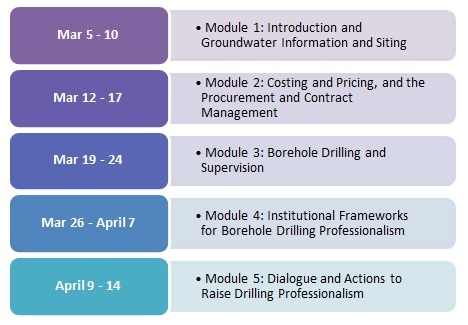Running over six weeks, the new online course provides participants with an overview of what is required to improve borehole drilling professionalism in the countries in which they work.
Requiring about six hours of investment per week, plus an additional four for the final assignment, it provides a 40-hour training opportunity for people from all over the world - and they can take part without leaving their home or workplace.
The application process was open for a month, and we received 648 applications spanning 381 organisations and 96 countries. We were astounded by the level of interest. Unfortunately, we could only accept 85 participants, a mere 13% of those who applied, our limitation being funding for sufficient, good facilitation. And so over the past weeks we have been interacting with the participants who work in 35 organisations in 43 countries, of whom 33% are women.
We provide extensive reading material and videos for each module, and the participants engage with the topics through their weekly assignments, participation in online discussion forums and a weekly quiz. For example, they have been tasked with looking at the drilling supervision practices in their own organisations, to prepare a hydrogeological desk study and to reflect on regulatory policies and practices in the countries in which they work.
I was sceptical about online courses until I undertook my first one three years ago. This time, as a facilitator, I've witnessed that this course provides an opportunity for people who are already managing drilling projects and programmes to improve their skills and knowledge from far and wide.
So what are we learning every day from the participants? For example, that drilling data is not shared because of fear that the information may be used for gaining the upper hand in mining minerals in one country. Or about the rapidly falling groundwater levels in Sanaa, Yemen, threatening the agriculture and domestic water supplies of the future. And we've found out about nuances in the way in which corruption affects the regulation of drilling professionalism in different contexts. Through the course, innovative approaches are also being revealed, such as new regulations in a number of countries, efforts to improve procurement procedures in Nigeria, or post-construction monitoring of water supply systems through private management combining mixed farming and water supply systems in northern Madagascar.

Course modules
Integral to the course is that it provides an opportunity for participants to learn from each other, reflect on what can be improved and to debate contentious topics - a key one being who should pay for the cost of drilling a dry borehole? The final assignment in the course involves sharing what has been learned more widely and trying to inspire others to improve borehole drilling management practices. Once the course is complete, all of the materials are accessible through the Cap-Net virtual campus (www.cap-net.org).
So what next, you may ask? Firstly, we shall learn from this first course and make improvements. We would then like to run the course again later in the year, repeat it in the future and also make it available in other languages, starting with French. We know that there is demand. With the structure and materials now developed and online, future courses will be less costly than developing and running the first one. But we need to assure the cost of good facilitation. So if anyone would like to sponsor a course, say as part of corporate social responsibility (CSR), either fully or partially, please contact us at foundation@skat.ch.
Kerstin Danert works for Skat Foundation and Skat Consulting in St. Gallen, Switzerland, and leads the Rural Water Supply Network's (RWSN) theme on Sustainable Groundwater Development. In 2017 she was awarded the Distinguished Associate Award by the International Association of Hydrogeologists


















